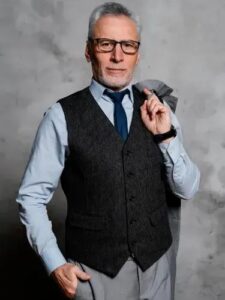A Lesson in Kindness: My 5-Year-Old Shared Water with a Mailman — What Happened Next Changed Everything

It began as an ordinary Tuesday afternoon, the kind that presses down on your shoulders with the weight of midsummer heat. The air shimmered above the pavement, cicadas hummed lazily in the trees, and even the breeze seemed too tired to move. I was on the porch, a tall glass of sweet tea sweating onto the railing, while my five-year-old son, Eli, sat on the driveway, coloring dinosaurs with chalk. His curls clung damply to his forehead as he worked with the kind of focus that only small children and artists seem to have.
“Mom,” he called suddenly, squinting down the street, “why’s that man walking funny?”
I followed his gaze. A mail carrier, one I didn’t recognize, was trudging up the sidewalk as if every step demanded more effort than the one before. His shoulders sagged beneath a faded satchel, his navy shirt darkened with sweat, and his face glowed red beneath the brim of his cap. He looked not much older than sixty, but the heat made him seem ancient.
“He’s just tired, honey,” I told Eli softly. “It’s really hot out.”
But Eli didn’t look convinced. His brow furrowed in that way that always made him look far older than five. He watched as the man paused, leaning slightly to one side, then forced himself forward again.
Across the street, Mrs. Lewis, in her immaculate sundress and designer sunglasses, was unloading groceries into her gleaming SUV. Her voice cut through the air like the crack of ice.
“Good heavens, I’d die before I let my husband work outside like that at his age,” she said to her friend. “Doesn’t he have any self-respect?”
Her friend laughed. “He looks ready to collapse right there. Someone ought to call an ambulance before he does!”
Further down, Mr. Campbell, our retired dentist, leaned against his garage door and called out with a grin, “Hey, pal! Mail doesn’t deliver itself, you know! Let’s move it!”
A pair of teenage boys rode past on their bikes, snickering. One said, “Bet he couldn’t afford to retire.” The other added, “My dad says that’s what happens when you don’t plan your life right.”
Their laughter trailed behind them like smoke.
Something in me tightened. These were our neighbors—people we’d shared barbecues with, who’d borrowed our lawn chairs and congratulated Eli on his first day of school. And yet, here they were, tearing someone down just for working hard under the sun.
Eli looked up at me, frowning. “Mom, why are they being mean? He’s just doing his job.”
My throat went tight. “I don’t know, baby. Sometimes people forget how to be kind.”
A Cup of Water
By the time the mailman reached our driveway, he was drenched, breathing hard, but still wearing a polite smile.
“Afternoon, ma’am,” he rasped, pulling a small stack of envelopes from his bag. “Got your electric bill and a few catalogs today.”
Before I could reply, Eli bolted upright. “Wait here, Mom!” he yelled, disappearing into the house.
The mailman blinked, puzzled. “Everything alright?”
I nodded, half-smiling. “He’s… full of ideas.”
Moments later, Eli came running back, both arms full. In one hand, he clutched his favorite Paw Patrol cup, filled with ice-cold water that was already sweating through the plastic. In the other, he held a chocolate bar, still wrapped but a little bent from his small grip.
He stopped in front of the mailman and extended both treasures solemnly.
“Here, Mr. Mailman,” he said. “You look really hot. You should have some water. And a treat.”
The man froze. For a second, he didn’t move — just stared at the offering as though he couldn’t quite believe it.
“Oh, buddy,” he said softly, voice rough. “That’s awfully kind, but you don’t have to—”
“It’s okay,” Eli interrupted. “My mom says when people work hard, they deserve a break.”
The man’s eyes filled, and he took the cup with trembling hands. He drank deeply, closing his eyes as though the water itself restored something more than just his thirst. Then, slowly, he unwrapped the candy and took a bite, smiling.
“What’s your name, champ?” he asked.
“Eli.”
“And where do you go to school, Eli?”
“Sunshine Preschool! We’re learning about dinosaurs this week.”
The man chuckled, kneeling so his eyes met Eli’s. “Well, Eli, you just made my day. Maybe even my whole year.” He looked up at me and tipped his hat. “You’ve raised a fine boy, ma’am. Thank you.”
When he walked away, Eli watched until the man disappeared around the corner. That evening, he drew a picture of a mailman with angel wings and labeled it, “My Superhero.”

The Red Bugatti
The next afternoon, when I pulled up to Eli’s preschool, something unusual caught my eye. At the curb sat a gleaming red Bugatti, its chrome accents flashing in the sun like fire. A few parents stood nearby whispering, snapping photos from a distance.
Then the driver stepped out — and my breath caught. It was him. The mailman. Only this time, he wore a tailored gray suit and polished shoes. His posture was proud, his movements calm, confident.
Eli’s jaw dropped. “Mom! It’s him! The mailman!”
He approached us with a kind smile and a small velvet box in hand. Crouching to Eli’s level, he said, “Hey, kiddo. You remember me?”
Eli nodded shyly.
Inside the box was a tiny red toy car — a perfect miniature of the Bugatti behind him.
“I used to collect these when I was your age,” he said. “Your kindness yesterday reminded me why I started doing what I do. This is for you.”
Eli’s face lit up like sunrise. “This is the coolest thing ever!”
Then the man looked at me. “I should tell you something,” he said. “I’m not really a mailman — not anymore. I built a logistics company years ago. Made enough to retire early. Every summer, I take a route for a few weeks. It keeps me humble. Reminds me of what work feels like.” He paused. “And yesterday, your son reminded me of something I’d started to forget — that people still care.”
He introduced himself simply as Jonathan and shook my hand. Then, tipping his head toward Eli, he added, “You’ve got a remarkable boy there.”
Before driving off, he said, “Keep encouraging that kindness. It’s rarer than any car.”

The Envelope
Two weeks later, an envelope arrived in the mail with no return address. Inside was a handwritten note and a folded check.
“Dear Eli,
Thank you for reminding an old man what goodness looks like.
This is for your future — college, adventures, or helping someone else someday.
Pay it forward.
With gratitude,
Jonathan.”
The check was for $25,000.
My husband and I quietly opened a college savings account in Eli’s name. We didn’t tell him where the money came from — not yet. He was too young to understand wealth, but he already understood something far more valuable: kindness.
That night, Eli asked if we could keep extra water bottles by the door “in case other people get hot.” I looked at my husband and smiled through a swell of emotion. “More cups it is,” I whispered. “Always more cups.”
The Lesson That Lasted
The story of the little boy and the mailman spread through our town faster than I expected. Neighbors who had laughed that day came by with apologies, each one a little quieter, a little humbler. Mrs. Lewis dropped off a case of bottled water for the real postal carriers. The teenagers volunteered at the community center.
Kindness, it seemed, had rippled outward — one small act sparking another.
Eli didn’t fully grasp the chain reaction he’d started, but he continued handing out water to delivery drivers, landscapers, even our trash collectors. To him, it wasn’t charity — it was friendship.
And as I watched him grow, I realized that wealth isn’t measured by the size of one’s car or the thickness of a checkbook, but by the size of one’s heart.
Sometimes, a five-year-old has to remind us: true generosity begins with a single, simple gesture — and a glass of cold water.